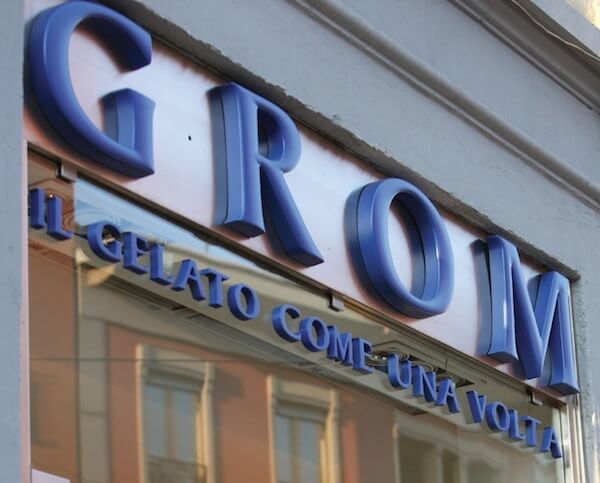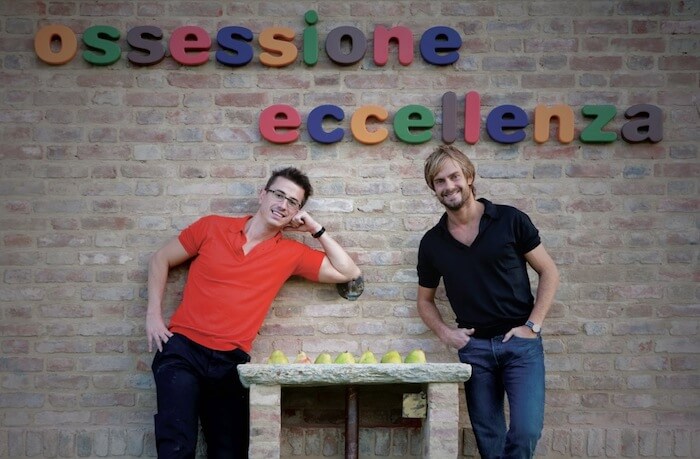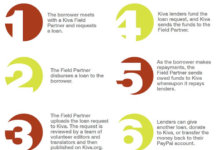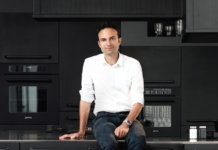Interview with Federico Grom, Co-Founder, Grom, Italy
The story behind the successful gelato brand Grom is in essence one of friendship. When Guido Martinetti and Federico Grom met in their teenage years they did not know that many years later they would embark on an incredible adventure together. About a decade ago both men were engaged in separate focuses, working in industries a world away from gelato. Guido was a winemaker deeply involved in agriculture, whilst Federico was the CFO of a multinational company, which dealt in facilitating financial operations and mergers.
One day, Guido read an article about the dying art of Italian gelato production based on artisanal best practice. Inspired by the obvious gap in the market, he set out to convince his good friend Federico of a new idea. By combining Guido’s knowledge of food and agriculture and Federico’s management expertise, the two friends would ambitiously set out to produce the best gelato in the world. In the following interview, Federico Grom speaks to Tharawat magazine about how crazy an idea has to be in order to work, the importance friendship represents in the pursuit of success, and most of all the love of gelato.
[ms-protect-content id=”4069, 4129″]
How has Grom come to be?
Guido came to me with this crazy idea to start a gelato shop. Fifteen days later I had written a business plan. From the first day our mission was clear: Sourcing the best ingredients, avoiding the use of any chemical additives, we would try to make the best gelato in the world. Ironically, this meant that we had succeeded in doing what is usually the hardest for entrepreneurs: Decide on the main objective of our enterprise. As we analysed our strengths and weaknesses to start implementing our ambitious business plan we realised that our greatest asset was our friendship. No matter what happened we knew it would happen to us together and that we would have fun on this journey. Of course, our main weakness was that quite frankly we didn’t know anything about making gelato! Secondly, according to the business plan we were to open six stores and neither of us had any experience in retail. The third and probably most defining weakness was that we had no money! In spite of all of these obstacles, Guido and I looked at each other and we knew that we were going to do it anyway.
So we began by learning how to make gelato and how to set up our first shop which was to be located in the centre of Torino, Italy. We put in all the money we had and asked for loans for our start up capital.
We started to sell our gelato in a small 25 square metre shop. The value proposition was based on one simple idea. If we put in the best ingredients, we cannot make a bad gelato. Our location was ideal and after one month the line of people queuing in front of our little shop was 30 metres long. During the following year we realised that the real key to the success of our business lay in managing the agricultural production of the ingredients and so in 2007 we bought our own farm in Piedmont. We started to cultivate our own fruit. We like to joke today that we manage our whole value chain from the quality of the manure to the design of the cup in which we serve our gelato. Our strategy is total vertical integration.
How are you able to guarantee high quality ingredients for your gelato?
Of course, we cannot cultivate all the ingredients on our farm in Piedmont. We source our lemons, for instance, from Sicily. Guido is in charge of the recipes and agriculture. He is travelling all over the world managing our relationships with suppliers. We have been fortunate enough to meet incredible people and have learnt so much from them; applying some of their best practice to our own farm.
We pride ourselves on having a modern take on agriculture. On our farm we have an experimental field where we cultivate 100 different varieties of fruit for our sorbets. To produce the best organic fruit we go into details such as the best treatment for the manure, which by the way is very expensive!
In the last 50 years, agriculture has changed completely. Even though history is trying to teach us otherwise, great mistakes are currently being made in this field by farmers applying chemicals in order to assure mass production to satisfy global demand. We are not treating Mother Earth with a lot of respect, and the ramifications for our health will soon become apparent. People spend all this time making up their minds on things like what car they drive and know dozens of brands by heart. But ask them whether they know the difference between the different types of fruits they eat and most of them will be dumbstruck. I ask you, what do you think is more important?
What are the keys to Grom’s sustained triumph?
We have recently published a book on our entrepreneurial journey titled ’Grom-The story of a friendship, some gelato and lots of flowers’, which is essentially based on thirteen chapters, which outline the factors we base our success on:
• The first factor is ‘Friendship’, which is based around the qualities of trust and fun that we experience at work and that we enforce throughout our company.
• The second factor is ‘Dream’. We think you should dream big and follow your ambitions.
• The third factor is ‘Passion’. Without passion, you cannot achieve your dreams.
• The fourth success factor is ‘Determination’, because without hard work none of this is possible. Nobody will give you anything for free.
• Factor number five is ‘Study’. You need to study every day and better your mind in order to keep up with your business.
• ‘Luck’ is success factor number six. When we opened our first shop in 2003 it was on the hottest day in a century! That was pure luck and certainly helped us along a great deal.
• The seventh factor is ‘Equilibrium’. You need to be balanced as a person and as a business. There must be good sense behind what you do.
• Factor number eight is ‘Curiosity’. You should be curious to learn new things.
• The ninth factor is something absolutely crucial and that is ‘Respect’. Respect for the environment, respect for employees, respect for yourself, respect for the company that is making you money.
• Our tenth success factor is ‘Flowers’. In order to be successful you should never forget that everything starts from small flowers. This we use also as a metaphor for the young talent we try to foster in our company. Women especially play a key role in our company. They enter the company young, after university, and as they progress they offer us great know how and we offer them great opportunities.
• The eleventh success factor is ‘Music’: If you want to achieve a greater goal everyone has to play along to the same tune. Your company should work like an orchestra whereby no one can afford to play in the wrong direction.
• Our final success factor lies in the word ‘Together’. We need to work together. A one-man show business is not sustainable.
All of these factors would be nothing without learning how to find happiness in the small things in our work and lives, which is explained in the thirteenth chapter of our book. This is what matters most.

What are the greatest obstacles that you’ve encountered?
The reality is that we encounter obstacles every day. And we make mistakes. But the biggest mistake would be not to learn from our experiences. I wish there were a way to incentivise a mistake made out of passion and effort for the job rather then rewarding people who achieve good results without passion or determination. Another big challenge that we’ve faced is a fear for becoming bigger and losing our identity. Another challenge was to transfer the passion we felt for the business to the people working with us. We today have more than 700 people working with us in all the different stores and our headquarters. Transferring passion is therefore a key factor to staying unified. It requires a lot of energy. But until now we have consistently worked on these challenges and are satisfied with the outcome.
As a leader you usually are alone facing these challenges. We are very lucky. Guido and I have each other to speak to. This works because we have complimentary skills, the same amount of passion and a similar level of education.
What is the meaning behind naming your gelato ‘Grom’?
It was Guido’s idea! He said to me, “Listen, we are in food, and we want to make the best gelato in the world. We need to put a name behind the business that stands for responsibility. We have a solution in-house. It’s your surname.” I was not convinced but in the end he won me over. He had a great vision, because it’s a name that sounds great in different languages. The name of the store is mine, but the public face of the company is Guido. We have a balance at Grom just like in our friendship; there is no jealousy between us.
Grom has grown incredibly fast. Has there been a competitive reaction by other gelato brands in Italy?
In Italy, we do not have organised gelato chains in spite of the popularity of the product. In Italy there is gelato at every corner but most of the shops are small and unique. In terms of size we do not have a competitor. We were two young guys, who opened more than 60 stores in 10 years. As far as we can tell this has not impacted these smaller stores. We do take care in sourcing the best ingredients, but in the end people will always buy gelato based on individual preferences for taste. We do believe that because of our unique value proposition of only using the best and healthy ingredients to produce our gelato, we have been able to globalise our brand and will continue to do so.
Tharawat Magazine, Issue 20, 2013
[/ms-protect-content]














